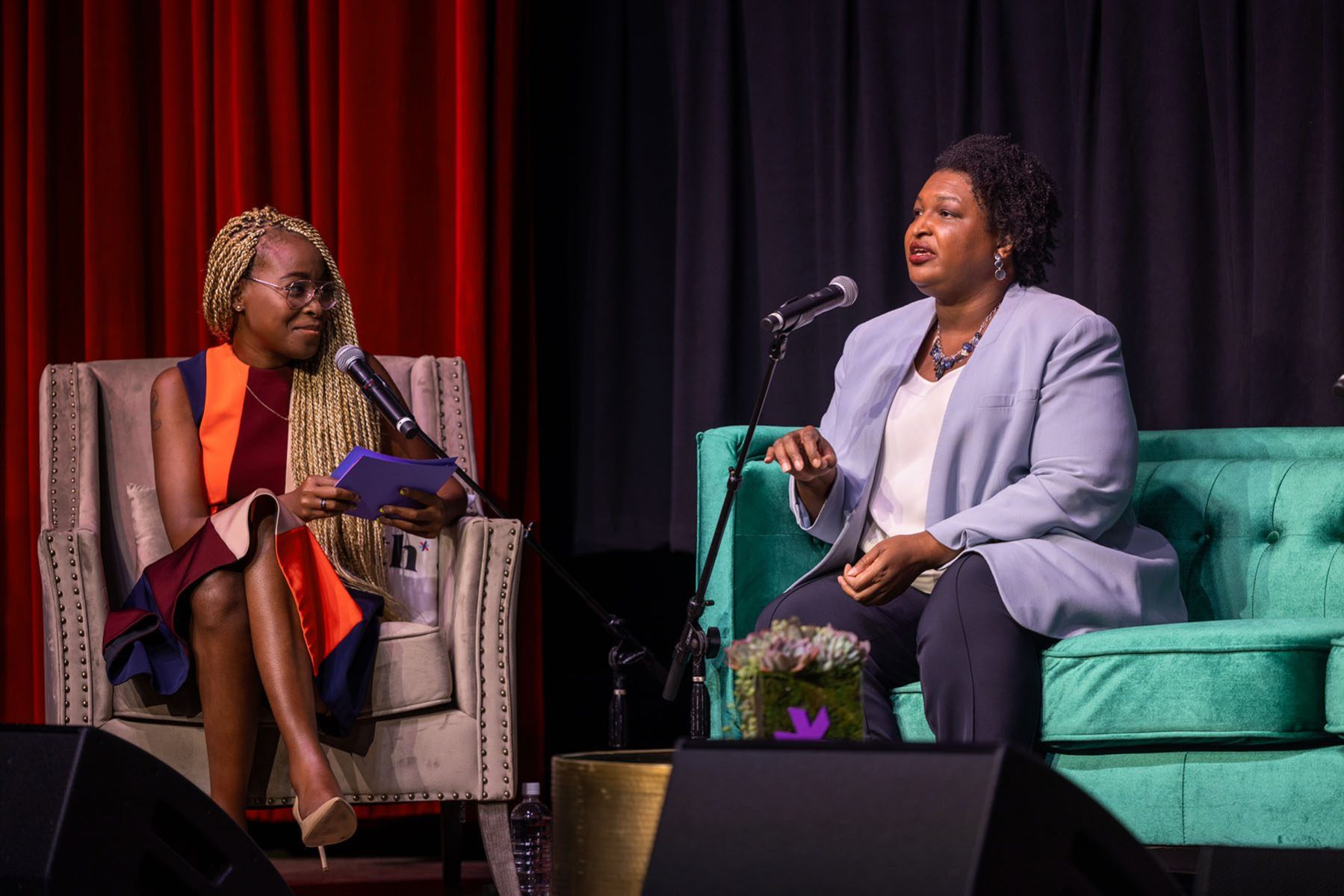*Correction appended.
Martha Haythorn, 22, has Down syndrome and gets help from her mother with everyday tasks like grocery shopping, meal planning and getting around. The Georgia Institute of Technology student would love to be living independently, but she’s been on a waitlist to receive in-home support services from the state of Georgia for six years — with no end in sight.
“I’ve been told with two healthy parents, she’s very low priority,” Haythorn’s mother, Mary Anona Stoops, told The 19th. Like many family caregivers, Stoops provides the unpaid, undersupported care necessary for her daughter to thrive.
Haythorn describes being on the waiting list as “really painful.”
“I want to be out in the community. We need to change this so people with disabilities can have social lives and lives worth living,” she said.
For thousands of Georgians with developmental and intellectual disabilities and their families, like Stoops and Haythorn, the result of the upcoming governor’s race could determine whether they’re able to live independently in their own homes or will remain in nursing homes or institutions, or reliant on unpaid family caregivers.
Democrat Stacey Abrams has pledged to end the state’s waiting list for in-home services for people with disabilities, while incumbent Republican Gov. Brian Kemp has a more modest plan that would leave more people in institutions.
The waiting list is not a new problem, Abrams told The 19th. But it is one she would like to do something about.
“I think it’s unlikely that Governor Kemp and the current legislature will take action because it’s not news. They have known about this problem, they have known about the numbers for the past four years and they have refused to take action,” Abrams said.
Midterm elections are only two weeks away, and early voting has started in Georgia. The race is tight, and Kemp has consistently outpolled Abrams.
According to the most recent data from the Kaiser Family Foundation, over 7,000 Georgians with developmental and intellectual disabilities are on the waiting list to receive Medicaid-funded disability services in their own homes, rather than in nursing homes or from unpaid family members.
Haythorn is currently attending Georgia Institute of Technology’s EXCEL program for students with intellectual disabilities. She said she loves to “read, learn, have friendships, sing, swim and speak [her] mind.” Stoops works part-time as a Presbyterian pastor and part-time providing the support Haythorn would receive through Georgia’s Medicaid waiver for home care.
“I haven’t worked full time since Martha was born in order to support her and her needs. We’ve had the privilege of doing that since my husband has been able to provide for us. But it also means I have no pension and no retirement. And it means my income-earning power has been diminished. But still, not all families have what we have. What about single parents? So it’s a huge equity issue as well,” Stoops said.
Disability services and health care are increasingly becoming politicized, Stoops said.
“In Georgia, ‘Medicaid’ has become a bad word. …It’s almost like people are blamed for having needs or that someone is at fault [for having a disability]. We have an upside-down understanding of the social contract,” Stoops said.
Abrams’ decision to highlight disability in her campaign is unusual. She has held campaign events and listening sessions specifically for different disabled constituencies in Georgia, including the Deaf and intellectual disability communities. Her campaign also has a disability coordinator and a full-time sign language interpreter.
“It’s about acknowledging the legitimate and solvable challenges the state can tackle for the disabled community, but it’s also about holding true to my belief system. I believe you cannot suggest inclusivity if you’re not looking at all of the communities that are marginalized and disadvantaged,” Abrams said.
Abrams also highlighted her commitment to disability issues last month during The 19th’s event focused on the 2022 election.
“I began my campaign with the intention to include everyone,” she told moderator and 19th editor-at-large Errin Haines. Abrams also highlighted the waiting list.
“We should not have a 7,000-person waiting list to provide services to those who are owed that responsibility by virtue of our humanity,” Abrams told Haines.
The main barriers to ending the waiting list, according to national and state-level experts, are political will and the initial expense. In the long term, home care tends to be less expensive than more institutional forms of care, according to a 2015 report from the National Council on Disability.
“Many states have waiting lists and have successfully cleared them, ensuring that people with disabilities can access the services they need to live in their own homes and communities. It requires a commitment from the state government and enough money to fund the needed placements, along with fair wages for the staff,” said Bethany Lilly, senior director of public policy for the national disability nonprofit The Arc of the United States.
Most recently, Wisconsin ended its waiting list for home care, not just for developmental and intellectual disabilities, but for a range of disabilities, as well as for older adults in 2021.
Kemp’s current budget for 2023 would add 100 slots to Georgia’s home care program — 1.4 percent of what is needed to serve all of the Georgians who currently qualify. Kemp’s office did not respond to requests for comment.
Dom Kelly, senior adviser for disability engagement and accessibility for the Abrams campaign, told The 19th that Abrams intends to use the state’s budget surplus to fund clearing the waiting list.
“Brian Kemp’s decision to only fund 100 waiver slots in FY2023 shows that not only does he not see the urgency of this moment, but he fundamentally does not care about Georgians with disabilities,” Kelly said.
-
More from The 19th
- ‘They see that it’s really in our hands now’: Young women work to get out the vote in the wake of Dobbs
- Emily’s List expands focus on diverse candidates and voting rights ahead of midterm elections
- With midterms looming, Georgia officials are grappling with challenges from election deniers
Abrams is proposing $35 million per year for four years to close out the waiting list. But would that be enough? According to Mark Crenshaw, assistant director of the Center for Leadership in Disability at Georgia State University, the math on Abrams’ proposal adds up. The biggest question is where the money is coming from.
“It could come from the budget surplus. It could come out of the rainy-day fund. If there was the political will, the legislature could raise the tobacco tax to the national average to generate the revenue,” he said.
Crenshaw also highlighted the need to increase provider payments to keep up with demand. “If we don’t raise the provider rate, there will be no one to provide the services,” he said. The United States is currently facing a severe shortage of care workers, and Georgia is no exception.
Martha Haythorn hopes that politicians — and voters — will consider the needs of people with disabilities in November. “I am definitely voting in the midterm election and really want everyone to vote to help people with disabilities,” she said.
Correction: An earlier version of this article incorrectly stated which school hosts the EXCEL program for students with intellectual disabilities.








